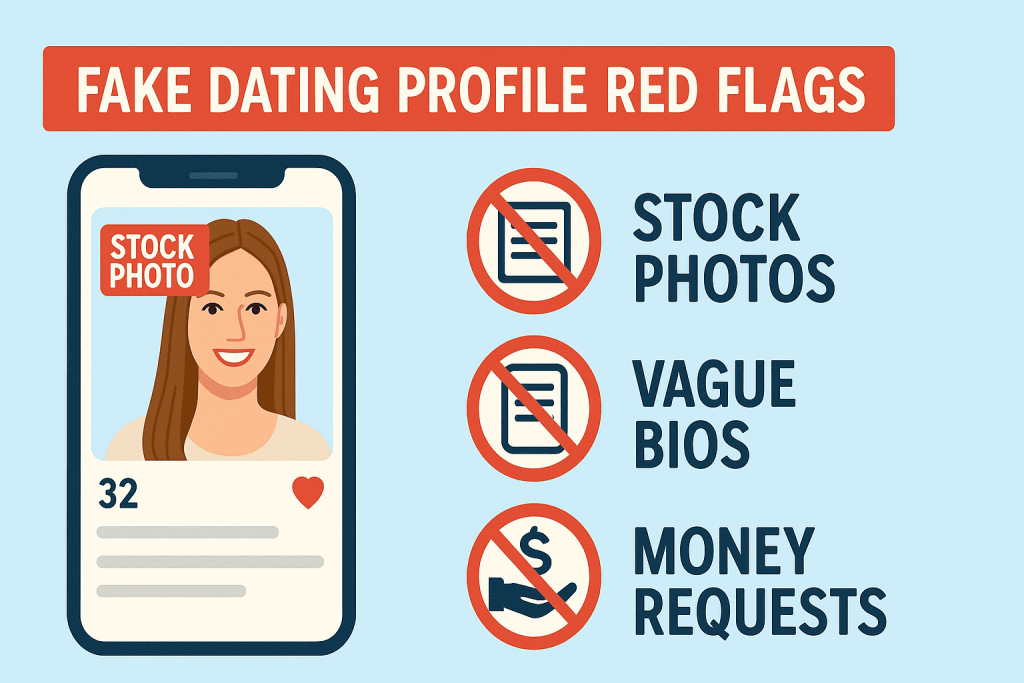The digital age has made it easier than ever to meet new people, build relationships, and find love online. Unfortunately, it’s also opened the door for deception. Catfishing the act of creating fake online identities to trick others has become one of the most troubling trends in digital dating. From fake dating profiles to elaborate catfish scams, millions of people have fallen victim to emotional manipulation and financial fraud. Romance Scams in Online Dating.
This guide breaks down the psychology, methods, and warning signs of catfishing and how you can protect yourself in today’s ever-connected world.
What Is Catfishing? Understanding the Online Deception
Catfishing is when someone creates a fake online identity to deceive others, usually on dating sites or social media. These imposters often use photos stolen from real people, fabricate backstories, and build emotional connections with unsuspecting victims.
While some catfishers seek attention or emotional validation, many others pursue darker goals including scams, blackmail, and financial theft.
At its core, catfishing exploits trust one of the most powerful and vulnerable human emotions.
The Psychology Behind Catfishing
To understand catfishers, we must look beyond the fake profile. Many of these individuals experience loneliness, insecurity, or a desire for control. The anonymity of the internet provides them a stage to create a “better” version of themselves one that’s attractive, confident, and charismatic.
Psychologists call this the “ideal self” phenomenon. In extreme cases, catfishers may even begin to believe their fabricated identities, living in a delusion built from digital lies.
Others, however, are motivated by greed. Catfish scams often start as emotional manipulation but quickly turn into financial exploitation.

Fake Dating Profiles: The Heart of Catfishing
Most catfishing begins with fake dating profiles carefully curated personas designed to look genuine. These profiles often include stolen photos, fake career details, and carefully scripted posts that make the person seem “too perfect.”
Common red flags include:
- Limited photos or all professional-looking images
- Quick emotional attachment or declarations of love
- Avoidance of video calls or in-person meetings
- Inconsistent stories about their background
Scammers understand the psychology of attraction and they know how to create a profile that triggers trust and emotional connection.
Catfish Scams: When Deception Turns into Exploitation
Catfish scams go far beyond emotional deceit. According to cybersecurity reports, online romance scams cost victims billions each year.
Here’s how a typical catfish scam unfolds:
- The Connection A fake dating profile initiates contact, often appearing kind, attractive, and emotionally available.
- The Bonding Phase The scammer builds trust through constant communication, affection, and empathy.
- The Crisis The scammer introduces an urgent situation (a sick relative, travel emergency, or lost wallet) and asks for financial help.
- The Vanishing Act Once the victim sends money, the scammer disappears, often deleting all accounts.
These catfish scams are sophisticated, using fake identities across multiple platforms. Some even employ voice changers or stolen video clips to appear legitimate.
Why People Fall for Catfishing and Catfish Scams
Falling for a catfish isn’t a sign of weakness it’s a human response. Scammers are experts in emotional manipulation. They use empathy, loneliness, and hope to build relationships that feel authentic.
Key reasons people fall victim include:
- Emotional vulnerability after divorce or loss
- Lack of experience with online dating
- Social isolation leading to dependence on digital connections
- Sophisticated deception fake photos, real-time chats, and video calls
In the digital age, even tech-savvy individuals can be duped. Catfishers adapt fast, evolving their strategies to exploit new apps and dating sites.
How to Identify Fake Dating Profiles Before It’s Too Late
Protecting yourself from catfishing starts with awareness. Here are proven ways to spot fake dating profiles:
- Reverse Image Search – Upload their photos to tools like Google Images or TinEye. If the photos appear under multiple names, it’s a red flag.
- Inconsistent Details – Pay attention to contradictions in stories about their job, travel, or family.
- Avoidance Behavior – If they refuse to video call, meet, or share their location, proceed with caution.
- Too Fast, Too Intense – Real relationships take time. If someone is professing love within days, it’s likely manipulation.
- Money Requests – Any request for cash, gift cards, or crypto is a sign of a catfish scam.
Catfishing on Social Media: Beyond Dating Apps
Catfishing doesn’t stop at dating platforms. Fake profiles are rampant across Instagram, Facebook, and TikTok, often used for:
- Building fake influencer personas
- Gaining followers and attention
- Running investment or crypto scams
- Spreading misinformation or phishing links
Social media catfishers leverage emotional storytelling and glamorous images to lure followers and sometimes exploit them financially or psychologically.

The Emotional Damage of Catfishing
Victims of catfishing often face lasting emotional scars. Beyond financial loss, they experience feelings of betrayal, shame, and self-doubt. Some report difficulty trusting others or engaging in online relationships again.
Experts compare catfishing trauma to emotional abuse a manipulation that breaks trust at its core. Recognizing this damage is the first step toward healing.
How to Protect Yourself from Catfish Scams
Here are proactive ways to stay safe online:
- Use verified dating platforms that screen and authenticate profiles.
- Never send money or personal information to someone you haven’t met in person.
- Keep conversations on official app channels, not private email or WhatsApp.
- Ask direct questions and verify small details to ensure authenticity.
- Report suspicious users immediately.
In today’s digital landscape, vigilance is key. Not all connections are genuine but the right platforms make authenticity a priority.
Catfishing and the Future of Online Dating
The fight against catfishing is evolving. With AI verification, identity tracking, and advanced fraud detection, dating platforms are finally taking real action to eliminate fake accounts.
The next generation of dating will prioritize trust, safety, and verification ensuring users can connect authentically without fear of deception.
Stay Safe, Stay Verified
Catfishing, fake dating profiles, and catfish scams reveal one truth online relationships need real safeguards. Awareness is your first line of defense, but choosing a verified and transparent platform is the ultimate protection.
Trusted and True is the first dating platform truly dedicated to eliminating fake profiles, bot scams, and catfishing. Stay ahead of the curve join our newsletter today and be the first to know about our latest updates and developments.











